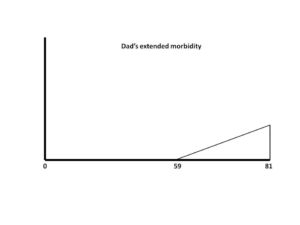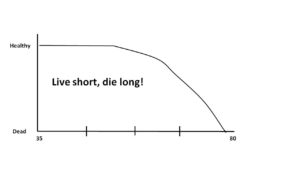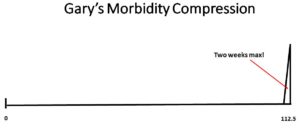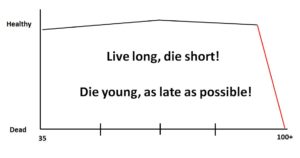Why Centenarians Don’t Rely on Doctors.

Photo by Martin Brosy on Unsplash
I did an 18-minute speech recently at my Toastmasters club – the last of 40 “formal” speeches that I’m required to give on my quest to achieve the top Toastmasters achievement tier, Distinguished Toastmaster.
I estimate I’ve delivered half again as many “informal” speeches at the club so I’m probably 60-70 speeches into it since I joined Toastmasters six years ago just because I want to continue to refine the craft and because, well – I admit – the strokes prop up my fragile ego. And Toastmasters clubs are great at delivering positive strokes, even when you muck up a good topic, which I do regularly. It’s a beautiful learning and confidence-building environment.
End of commercial.
My speech was about “compression of morbidity” and “frailty avoidance” – probably a real yawner to any other type of gathering. They all seemed to like it, most likely because they all like me (it’s a Toastmaster trait – they overlook personality deficiencies) and because it was my 77th birthday. There was probably a touch of sympathy factor there as well.
I used my dad’s extended morbidity chronology as the launch of the speech. It goes like this:
- Heart attack – age 59
- Stopped smoking, ate better, lost weight
- Early ’70s, diagnosed with COPD – began a restricted life of hoses and oxygen tanks
- Age 77, falls, breaks a hip
- Hip replacement
- Sepsis infection following surgery – extended intubation
- Extended hospital recovery from intubation; no voice, no sleep
- Rehab facility
- A short stint in a small retirement home
- One year stay in a larger nursing home
- Second heart attack; dead next day at 81
Webster defines morbidity as diseased, sickly, grisly, gruesome. That pretty well described my dad’s final years.
On a simple graph, Dad’s morbidity looked something like this:

The point of the speech was that our incredible advances in medical and scientific technology haven’t done much to compress this morbidity stretch in our culture. We are still good at “living short and dying long.” We’ve gotten pretty good at adding years to our lives but not at adding life to our years. So we continue to maintain a life curve that bends like this:

I shared my own planned morbidity curve with the group.

Expecting gasps, I got muted guffaws – I believe my fellow TMer’s are tiring of my “I’m living to 112.5” mantra.
But I forged on, undeterred because it’s the Toastmaster way – finish, no matter how bad it is.
I’ll condense the 18-minutes to this: bad lifestyle choices lead to insidious morbidity which leads to frailty which leads to death.
I think that would pass a medical scientist’s review for accuracy.
Pretty simple. We start at zero with a full arsenal of cellular-based weapons called an immune system and we proceed to make it difficult for it to do its job.
I’ll paraphrase neuropsychologist Dr. Mario Martinez: we inherit our health; our culture teaches us to be sick.
Dad didn’t know much about all this. He grew up when we knew little about how our biology works. He ate 3-4 eggs for breakfast most of his life; meat and potatoes were standard fare; athletes and actors, dentist and doctors advocated for cigarettes and babies were used to market them (he smoked for 40 years); exercise was whatever physical exertion happened at work.
His extended morbidity was pretty much a given from the start.
So what does this all have to do with centenarians not relying on doctors?
Based on research of healthy centenarians across a multitude of cultures, one of the consistent traits amongst them was that of an “outlier” attitude. They tend to defy the expectations of culturally-defined life segments or portals (e.g middle-age, old-age). They don’t succumb to the admonishment that accompanies the failure to comply or fit into the boundaries of a cultural portal.
Wrinkled rebels, with a worthy cause – live long, die short.

Somewhere along the way, they realized that their biology can be adversely affected by the cultural labels and traditions that they lay on it. For instance, they understand that if you believe you are too old for something, your biology will comply.
In the words of Dr. Martinez, they become “worthy outliers” and enter into “centenarian consciousness: an opportunity to live the causes of healthy longevity.”
So, it follows that a “worthy outlier” with a “centenarian consciousness” is not going to be beholden to a doc that thinks in portals (e.g. “you’re too old for that” or “what do you expect at your age?”) and practices only traditional medicine, rather than mind/body medicine. Healthy centenarians seem to realize that they are more than just the sum of their body parts and that their mind impacts those body parts.
Resilience prevails
Another trait of healthy centenarians is their ability to not only overcome trauma and travails but actually thrive and find gratitude in the midst of adversity and expect a better future following it.
Again, in the words of Dr. Martinez: “Despite the initial physical and emotional pain of trauma, they maintain a sense of humor and hope for recovery. More important, their positive expectations enable them to learn from the negative experience.”
I take from all this that being a “cultural outlier” with a “centenarian consciousness” can position us to compress our morbidity, delay our terminal frailty and thus live a longer, healthier and happier life while saving our society billions in late-life healthcare costs.
The tough part is to shake off the cultural expectations and be an outlier. It takes some thick skin and a strong self-image.
Dad knew nothing about all this cultural portal stuff – it preceded him. His morbidity started at 59 and grew insidiously for 22 years – not an uncommon timeline in our society despite medical advances. He wasn’t destined to be a healthy centenarian – few from his generation were.
But we’re smarter now. At least book smarter. We know all that we need to know to be healthier and live longer. Yet we don’t act that out. Our average longevity is now starting to recede after a century of meteoric acceleration and the five major killers continue to hold their position despite us knowing they are all largely preventable.
Perhaps it’s going to take the “centenarian outlier attitude and consciousness” to turn the tide. There was a time we paid attention to the wisdom of our elders.
Maybe now would be a good time to be an outlier and listen to the outliers.





Happy birthday Gary. You are the youngest outlier I know. (Just learned the word.) Congrats on your Toastmasters’ accomplishment.
If anyone makes it to be a Centenarian, I believe you will.
Thank you Laura. I’m going for 112.5 – wanna come along?
I plan on coming along! Thank you for this article. Have you watched fat sick and nearly dead? Also there is a guy from Poland I think he’s 109 who rode his bike every day to work, competed in track and field over the age of 100 and avoids going to doctors.
Thanks for the inspiring article, Gary. I’m still an outlier, despite recently having sold my motor scooter, given up roller blading and taking a pass on other risky activities for which I have to admit I’m now too old. Aging gracefully is about having fun. Pushing the envelope with risks is no longer fun. Thank God my interests have changed. Here are some things I now enjoy that improve my life, keep me active, intrigued and on my way to living long and dying short:
Keto nutrition (high fat, low carb, moderate protein) is serving me well. We need the fats for good brain and nerve function, especially as we age. (However, there are some fats to avoid.) This takes a lot more planning, shopping and prepping, but heck, cooking has become far more interesting!
I recently learned about how “Earthing” reduces inflammation and improves overall health. Here’s a worthwhile video with bona fide research: https://vimeo.com/205264910 I just ordered Laura Koniver, M.D.’s grounding blanket and can’t wait to try it. Persistent inflammation and more than normal pain 8 weeks out from total hip replacement due to a one inch leg length difference prompted me to research. I’ll let you know how earthing/grounding works for me. I intend to toss those ugly, clumsy (and dangerous!) shoe elevators and wear flip flops again this summer.
I recently learned that magenesium glycinate aids falling asleep and magnesium malate improves alertness in the morning. Never knew the kind of magnesium makes all the difference. I’m looking into making my own magnesium bicarbonate to add to my drinking water for better energy and muscle recovery throughout the day.
I’m enjoying helping my daughter take care of her 8-month-old son every day, as well as working on many projects that keep my computer and writing skills fresh. Looking forward to hiking and doing Zumba again soon to get my aerobic capacity back. Grateful for so many things, including being old enough to know every setback is an opportunity to discover something to improve my life, and there are always more blessings coming my way.
Thanks for your inspiring message, Gary. Got me thinking about all of the above, and how loving life unconditionally is the whole point of the adventure. It’s our ultimate purpose, and as long as we have a purpose and God is willing, we will be centenarians!
Best,
Margie
Hey Margie – great to hear from you. Really glad you are tuning into the articles and finding some inspiration. Congrats on “grandmahood” – life changers aren’t they? Stay in touch.
I fail to see why the aim of the aged seems to be to live as long as possible. Why persist in the upbeat lane of living until one is over 100?
Everyone I meet or see who is over 90 admits to being tired and lonely often bored – is actually “ready to die” .
Whats wrong with that? I would rather see all the effort at living longer go into doctor assisted euthanasia on request.
An easy passing at my own request…………………. thats what I want. Not a life of guilt about what to eat, time to exercise and all that nonsense.- to satisfy some strangers ego
Thanks for taking the time to comment, Barry. Yours is certainly an interesting position. I agree – it’s sad to see the number of 80 and 90-year old that are sad and lonely. I do, however, find there are more and more folks that age that are vibrant, happy and who continue to find ways to be productive. So often it seems to come down to attitude, a sense of purpose and resilience in the face of serious challenges and setbacks.
Thanks for being a reader and I hope you will continue to share your thoughts.
Could it be that those of us that are shooting for 100 are pioneers on new ways of living,appreciating and cherishing life on this planet. We are teaching ourselves how to enjoy our time here and showing the way for the younger people. I want to live as long as I can but I also want to be healthy and I believe that that is in many ways mostly under my control.
My uncle was a doctor who told us that if we want to live a long time, avoid doctors except for emergencies. Doctors will tell families things they’d never admit to patients. The lesson is we must become our own doctors and use the medical system as one of our tools. We mustn’t forget that pill-pushing doctors are trained to ‘treat’ illnesses rather than cure them. The best cure is prevention through proper diet (real food, not processed garbage,) exercise, weight control, sleep, stress management, etc.
For 36 years I fasted two days in a row every week. It gave me more energy, I needed less sleep and it made me mentally sharper. In my 37th year of regular fasting I discovered the benefits of longer fasts. I now fast 3 days in a row every week and do 7-day (or longer) fasts once a month. I also start each fast with a two day ‘dry’ fast (no water) which kick-starts the metabolism to rapidly increase human growth hormones, stem cells and ketones as well as accelerating the autophagy process.
I’ve also begun a semi-Keto diet although not as strict as full-Keto because fasting increases ketones even during eating days as a recent blood analysis demonstrated after 3 days of eating. The doctor said, “Whatever you’re doing, keep doing it.” I’m 68 years old, my health keeps getting better and I’m on zero medication. Here are some of the ‘metabolic resets’ I’ve achieved with longer fasts:
a)Several 40 & 50 year-old, lumpy scar tissue welts disappeared leaving scars barely noticeable.
b) Symptoms of my environmental allergies disappeared so I stopped taking my APO-Fluticasone meds (propionate aqueous nasal spray.) One of the most troublesome allergies was mold (spores.) You’d be amazed how many buildings are ‘sick’ with mold especially older, flat-roofed buildings that are prone to leaks.
c) Every month or two I’d develop a case of eczema/psoriasis on my chest for which I’d apply a prescription Topicort cream (desoximetasone 0.25%.) This might have been related to my previous environmental allergies.
d) I developed THIRST for the first time in my life. Previously, I had to force myself to drink water that I never liked because I knew I’d get dehydration headaches if I didn’t drink enough so I monitored my urine color. Now, I love the taste of water and willingly drink lots while fasting and eating.
e) I had all my mercury-amalgam molars crowned the last ten years, but about two years ago one became sore and the dentist said it “might” be infected and recommended a root canal and dental implant. The Orthodontist quoted the cost (all in – 3 procedures for both professionals) between CDN $4,000 – $5,000. I said I’d wait. After my last 7-day fast my tooth has healed.
f) I lost more than 40 LB in the first 4 months of extended fasting and it’s staying off.
g) I no longer have to loosen my shoelaces when sitting because all my shoes no longer hurt my feet like they did the past several years. It’s not like my feet had been fat because some of my safety shoes were fairly loose-fitting and they never bothered me before.
h) I used to drink dill pickle juice to control my leg cramping during sleep. My leg cramps have stopped so I no longer drink it.
Dr. Roy Walford, a UCLA Gerontologist did a meta-analysis of numerous fasting experiments on both humans and animals and concluded in his 1982 book “Maximum Lifespan” that one of the benefits of regular fasting is it reduces the aging process by half. That was the year I began regular fasting. Much more has recently been learned about the benefits of fasting.
Amazing story Gerold. I’d love to follow your story over the next 20, 30 (or much more?) years. 😉
I don’t trust most online marketers, but to be honest I have learned a ton from this guy on YouTube named James Jernigan
A lot of what you mention is astonishingly accurate and that makes me wonder why I hadn’t looked at this with this light before. Your article really did turn the light on for me personally as far as this particular subject matter goes. But there is just one point I am not too comfy with so while I attempt to reconcile that with the actual main theme of your position, permit me see exactly what all the rest of your subscribers have to point out.Well done.
Dear makeagingwork.com admin, Your posts are always well researched and well written.
Hi makeagingwork.com admin, Great content!
Hello makeagingwork.com admin, You always provide useful information.
Hi makeagingwork.com admin, Your posts are always well-supported by facts and figures.
Hello makeagingwork.com webmaster, Your posts are always a great source of knowledge.
To the makeagingwork.com administrator, Your posts are always informative and well-explained.
Hello makeagingwork.com administrator, Your posts are always well-supported by research and data.
Hi makeagingwork.com webmaster, Your posts are always well-supported by facts and figures.
Hi makeagingwork.com admin, Your posts are always well-referenced and credible.
Dear makeagingwork.com owner, Well done!
Dear makeagingwork.com administrator, Your posts are always on point.
To the makeagingwork.com webmaster, Your posts are always a great source of knowledge.